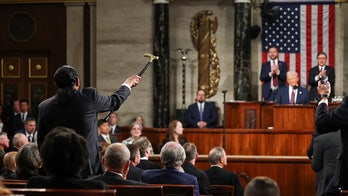Homeland Security issues new domestic terrorism threat bulletin
FOX News Pentagon correspondent Lucas Tomlinson has the latest on 'Special Report'
The Intelligence Community said domestic violent extremism poses a "heightened threat" in 2021, according to an unclassified summary released Wednesday.
President Biden in January tasked the Office of the Director of National Intelligence with creating a "comprehensive threat assessment" on domestic violent extremism after the Jan. 6 Capitol riot, which left five people dead.
"The IC assesses that domestic violent extremists (DVEs) who are motivated by a range of ideologies and galvanized by recent political and societal events in the United States pose an elevated threat to the Homeland in 2021," the report, which was released Wednesday by ODNI, the Justice Department, and the Department of Homeland Security, states.
The Intelligence Community, in the summary, defined a DVE as "an individual based and operating primarily in the United States without direction or inspiration from a foreign terrorist group or other foreign power and who seeks to further political or social goals wholly or in part through unlawful acts of force or violence."
"This assessment does not evaluate the actions of individuals engaged solely in activities protected by the First Amendment or other rights secured by the Constitution of the United States," the summary read.
The report notes that "mere advocacy of political or social positions, political activism, use of strong rhetoric, or generalized philosophic embrace of violent tactics may not constitute violent extremism, and may be constitutionally protected."
The report breaks down a number of domestic violent extremists, including: racially or ethnically motivated violent extremists; anti-government/anti-authority violent extremists; animal rights environmental violent extremists; abortion-related violent extremists; and more.
The report notes that "sociopolitical developments," like narratives of fraud in the 2020 presidential election, the violent breach of the U.S. Capitol on Jan. 6, conditions related to the coronavirus pandemic and "conspiracy theories promoting violence" will "almost certainly spur some DVEs to try to engage in violence this year."
The intelligence community found that "lone offenders or small cells of DVEs adhering to a diverse set of violent extremist ideologies are more likely to carry out violent attacks in the Homeland than organizations that allegedly advocate a DVE ideology."
DHS: US UNDER 'HEIGHTENED THREAT ENVIRONMENT' AMID CONCERNS OVER 'VIOLENT RIOTS'
The report found that DVE attackers "often radicalize independently by consuming violent extremist material online and mobilize without direction from a violent extremist organization, making detection and disruption difficult."
The intelligence community assessed that "racially or ethnically motivated violent extremists (RMVE) and militia violent extremists (MVE)" present the "most lethal" domestic violent extremists threats.
Racially motivated extremists are "most likely to conduct mass-casualty attacks against civilians," while militia violent extremists are "typically targeting law enforcement and government personnel and facilities."
"The IC assesses that US RMVEs who promote the superiority of the white race are the DVE actors with the most persistent and concerning transnational connections because individuals with similar ideological beliefs exist outside of the United States," the report stated, adding that those individuals "frequently communicate with and seek to influence each other," and noted that those individuals "have traveled abroad to network with like-minded individuals."
The intelligence community also noted that domestic violent extremists "exploit a variety of social media platforms," as well as smaller websites with targeted audiences, encrypted chat applications to recruit new "adherents," and "plan and rally support for in-person actions," as well as disseminate materials that contribute to "radicalization and mobilization to violence."
Several factors could increase the likelihood or "lethality" of the extremist attacks this year and beyond, including escalating support from people in the U.S. or abroad, growing perceptions of government overreach related to legal or policy changes and disruptions, and "high-profile attacks spurring follow-on attacks."
The intelligence community warned that "lone offenders" will continue to pose "significant detection and disruption challenges" because of their capacity for "independent radicalization to violence, ability to mobilize discretely, and access to firearms."
The unclassified summary of the intelligence community assessment describes domestic violent extremists as "US-based actors who conduct or threaten activities that are dangerous to human life in violation of the criminal laws of the United States or any state; appearing to be intended to intimidate or coerce a civilian population; and influence the policy of a government by intimidation or coercion, or affect the conduct of a government by mass destruction, assassination, or kidnapping, as per the definition of domestic terrorism in 18 U.S. Code 2331 (5)."
The White House in January said the report would be a "fact-based analysis" on how the administration can "shape policy," and called the president’s request a "first step in the process."
White House Press Secretary Jen Psaki said, at the time, that the decisions on policy will rely on law enforcement and guidance from the intelligence community, and that the goal would be to "disrupt violent extremist networks and more."
Biden, during his inaugural address, addressed "a rise of political extremism, of White supremacy and domestic terrorism," which, he said, "we must confront and we will defeat."















































